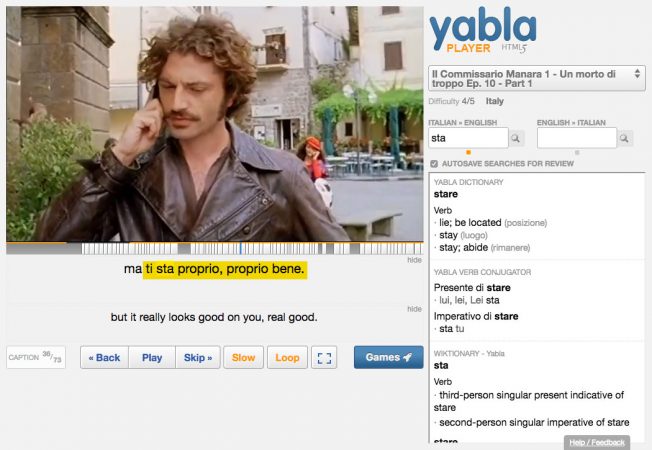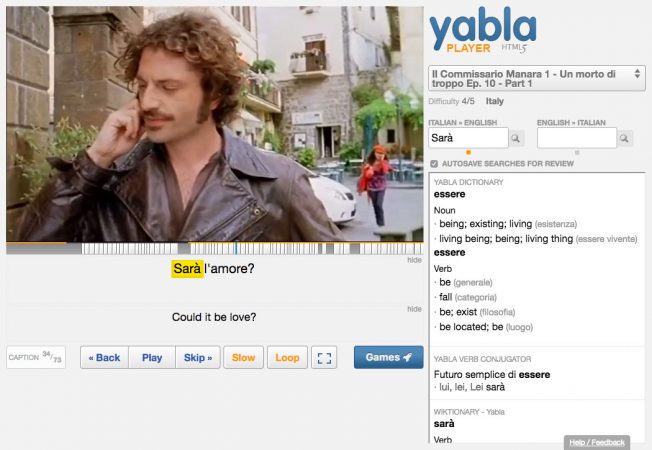| For those of you looking to develop your ear, Sgrammaticando on YouTube is a perfect way to do it. With her videos, Fiorella teaches grammar, verbs, phrases, usage, and typical idioms all in Italian. She has graciously allowed me to post transcriptions of her excellent videos here on My Italian Diary and I think they are perfect for learning and perfecting your Italian. | Per tutti quelli che vogliono sviluppare un po' d'orecchio per la lingua italiana, il canale Sgrammaticando su YouTube rappresenta uno strumento perfetto per farlo. Tramite i suoi video, Fiorella riesce ad insegnare grammatica, verbi, frasi, e espressioni tipiche; tutto questo in italiano autentico. Lei mi ha gentilmente permesso di postare le trascrizioni dei suoi fantastici video qui su My Italian Diary e credo che guardare i suoi video rappresenti una combinazione perfetta per imparare o perfezionare la lingua. |
Trascrizione: Sgrammaticando #196: Significato e utilizzo di PREGO
di Sgrammaticando
Difficoltà: intermedio
Ciao ragazzi. Piccolo video dedicato alla parola molto utilizzata in italiano – prego. Oltre essere la prima persona singolare del presente indicativo del verbo pregare io prego, ma questo significato non ci interessa, e anche un parolina usata per diverse… um… con diverse funzioni, in diverse circostanze le più importanti tre, diciamo. Allora, prego viene utilizzato ad esempio in risposta a qualcuno che ringrazia, quindi, qualcuno che ci ringrazia. «Grazie per il tuo aiuto» e rispondiamo «Prego» come per dire «Figurati! Non c’è di che!» Um… quindi, «Prego.»
Viene utilizzata con un intonazione interrogativa, diciamo «Prego?» quando ad esempio non capiamo qualcosa che ci viene detto e invitiamo la persona a ripetere quello che ha detto che non abbiamo capito. Ad esempio, supponiamo che io dico il mio nome a una persona straniera che non l’ha mai sentito di quel mio nome Fiorella, ma questa persona non ha capito come il mio nome quindi mi chiede «Prego?» come per dire «Puoi ripetere il tuo nome?» È un sinonimo in questo caso del interrogazione «Come?» Perché non ha capito. Come per invitare appunto a ripetere quello che è stato detto, perché appunto non è stato capito.
Come il terzo utilizzo, il prego è usato quando qualcuno in un certo senso chiede il permesso di fare qualcosa. Ad esempio, il permesso di passare come dire «Scusi? Permesso? Posso passare?» «Prego!» E con la risposta del genere, con prego noi invitiamo a fare, insomma, a questo diamo il consenso, in un certo senso. Oppure immaginiamo qualcosa come «Posso utilizzare il suo telefono?» «Prego, faccia pure!»
E quindi questi sono gli usi principali della parola prego. Spero di aver accontentato la richiesta che mi è stato fatto sulla pagina Facebook. Spero che questa video possa esservi stata utile e spero che possa essere utile anche a tante altre persone in futuro. Vi invito a fare gli esercizi sul sito www. impariamoitaliano.com e noi ci vediamo al prossimo video.
Follow Sgrammaticando on Facebook




